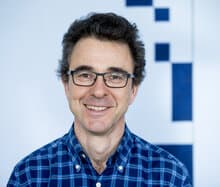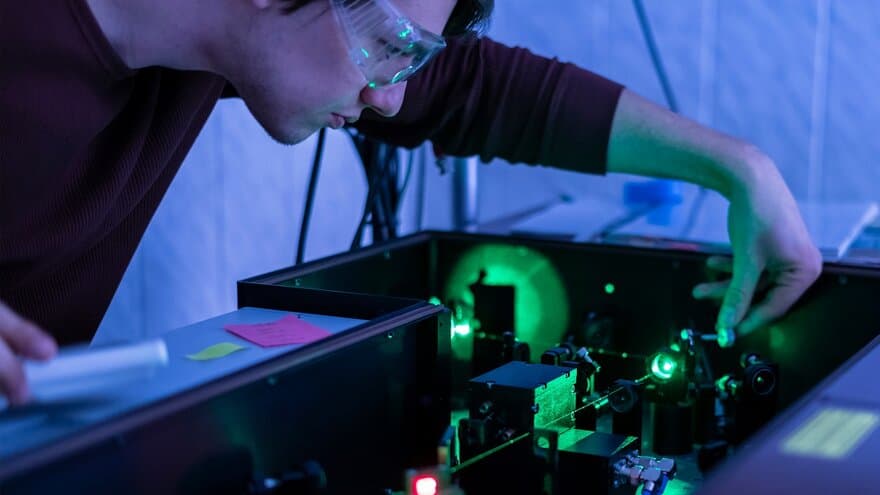Master (2-årig)HeltidFotonikk
Please note: This program does not admit new students.
Have you ever thought of how important light is in the technology surrounding us? Light plays a central role in car sensors, internet, cameras in drones, solar cells – and so much more! These technologies build on photonics, the physics of photons.
Søknadsfrist:
April 15th
International applicants:
December 1st
Studiestart:
Autumn 2023
Opptakskrav:
Bachelor in physics, electrical engineering or similar
- Higher Education Entrance Qualification and a completed bachelor's degree comparable to a Norwegian bachelor's degree included a specialization worth 80 ECTS
- Applicants with a Norwegian degree in Engineering must have the courses Mathematical Methods I, II and III (or comparable) and Statistics (worth 30 ECTS) included in their degree. Other applicants must have at least 30 ECTS Mathematics courses and 5 ECTS Statistics courses.
- There is a minimum mark requirement of C for admission
English requirements - One of the following special admission requirements for English language skills must be met:
- upper secondary school foundation and/or level 1 course in English (five periods per week) with the mark 4 or better (alternatively, a pass in English in upper secondary advanced course I and/or II)
- Test of English as a Foreign Language (TOEFL) with a result of at least 580 points for the paper based test (PBT) or 92 points for the Internet based test (IBT)
- International English Language Testing Service (IELTS) test with a score of at least 7.0 points
- other approved documentation by individual assessment
Applicants are ranked for admission according to the weighting and relevance of their previous education.
Applicants with only partial relevant education in relation to the required specialization in the program may use more than two years to complete since more bachelor courses need to be repeated.
Photonics is considered a Key Enabling Technology by the EU, and the ongoing development of advanced light sources and detectors will continue to be vital for Europe in the future. Innovation in photonics will contribute to solve societal challenges and create sustainable economies.
This programme is taught in English, see the English version of the programme for full description.
Knowledge:
- Have theoretical and practical understanding of the physics of light, optics and optical systems.
- Have theoretical and practical knowledge in nano- and microphotonics.
- Have theoretical and practical knowledge in light sources, waveguides and detectors, and analyze optical systems where these components are used.
- Have theoretical and practical knowledge in electronics related to sensors, and analyze in which systems they can be integrated.
- Have theoretical and practical knowledge within Biophotonics and gain an overview of the analytical methods used in the field.
- Have theoretical and practical knowledge in evaluation and analysis of optical sensor data.
- Have theoretical knowledge in material science and interaction between light and matter, for use in for example optimization of sensors and detectors.
- Have knowledge about how the discipline has evolved and impacted society, and use this to analyze relevant issues.
Skills:
- Able to apply computational methods in photonics.
- Able to apply techniques in hyperspectral imaging and spectroscopy.
- Able to apply photonic techniques in areas such as solar cells, biophotonics and robotics.
- Able to apply photonic devices for real-world problems.
- Able to plan and perform a small-scale research projects by using relevant scientific methods to solve problems, think critically, analyse, interpret and present gathered information and apply academic knowledge in an independent way.
- Demonstrate thorough knowledge of the scholarly theories and methods in the field.
- Able to carry out interdisciplinary analyses of issues and to evaluate solutions related to environment and sustainable development in collaboration with colleagues from other academic fields.
- Able to carry out independent, limited research or development projects under supervision and in accordance with applicable norms for research ethics.
- Able to analyze and critically evaluate various sources of information and use them to structure and formulate scholarly arguments.
General competence:
- Able to develop own ideas and to contribute to innovation processes in photonics related fields.
- After completing the program, the students have sufficient theoretical basis in order to proceed with a doctoral program and can communicate and collaborate professionally in an international study or work context.
- Able to continue studies in a manner that is largely self-directed and autonomous
- Able to communicate about academic issues, analyses and conclusions in the field, both with specialists and the general public
- Able to implement photonic technologies in fields such as robotics, surveillance, remote sensing, telecommunication, food production processes, environmental monitoring etc.
The photonics master program will include exchange programs with with leading universities in photonics in Europe (Jena, Ulm etc.). The program coordinator has today close research collaboration with these and other institutions through European research projects.
The new strategic program ‘Students Research Labs’ at REALTEK is an integrated part of the photonics studies. Through the student research labs, photonic students will have the opportunity to participate in international research projects.
With a masters degree in photonics, the student gains a general competence in the three main fields within photonics; light generation, light transmission and sensor technology. Optics, electrodynamics and materials science are key topics. In addition, you will gain knowledge of computational tools used in the industry. He or she will be able to immerse yourself in, among other things, sensor fusion, optical systems, camera technology, computer science, analytical methods and process.
The Master of Photonics offers two main directions- Photonics engineering: he or she learns about complex systems where photonics plays a central role, about optical components and about how light interacts with matter. This specialization provides expertise xwhich is relevant in many exciting applications. Two examples are optical design for cameras and the development of sensors for gas measurement.
- Photonics metrology: he or she learns how photons carry information and how photonics is used in measurements. Key areas are hyperspectral imaging, spectroscopy and data analysis. Examples of applications are material characterization for solar cell research, medical diagnostics and interpretation of advanced sensor data - to name a few.
- Throughout the study program, the students will participate in lectures and tutorials. Several of the courses includes lab courses where the students will be introduced to relevant practical exercises.
The photonic students will be encouraged to apply for the student research lab (SRL). The students included in SRL will take part in ongoing relevant research project at REALTEK. The SRLs will allow the students to participate in research projects and to conduct their own small research projects as part of bigger research activities under supervision of researchers. The student will be exposed to applied research and industry through these projects. They will be able to participate in innovation activities.
There can be group work with experts in a team composed of students with multidisciplinary background. The student solve tasks in these teams. They will learn to communicate with team members with different background and learn to present their results in a way that people with different background can understand them.
In addition to exposing students to industry-relevant research and development projects in student research labs, the students will also get the opportunity to take a course within business, innovation and entrepreneurship, and will be introduced to Eik Ideverksted. This will give students the tools they need to develop their own innovative ideas and the possibility to transform them into start-ups.
Several companies from industry have expressed a strong interest for being part of the photonics master education at NMBU (For more information and a list of industries see elsewhere in the programme application and description. They have offered to support the studies by excursions, guest lectures, term papers, internships and master theses. This will expose the students at an early stage and throughout the study to industry relevant research and development topics.
- The students will encounter various forms of assessments, such as written and oral examinations, assignments, project reports and presentations.
The master thesis is an independent piece of work that will be defended at an oral presentation in front of the audience (the public), supervisor and examiner. The student obtains specialized knowledge in a topic.
The quality of the program and all courses are evaluated according to the quality assurance system for higher education at NMBU.
Studieveileder(e):


